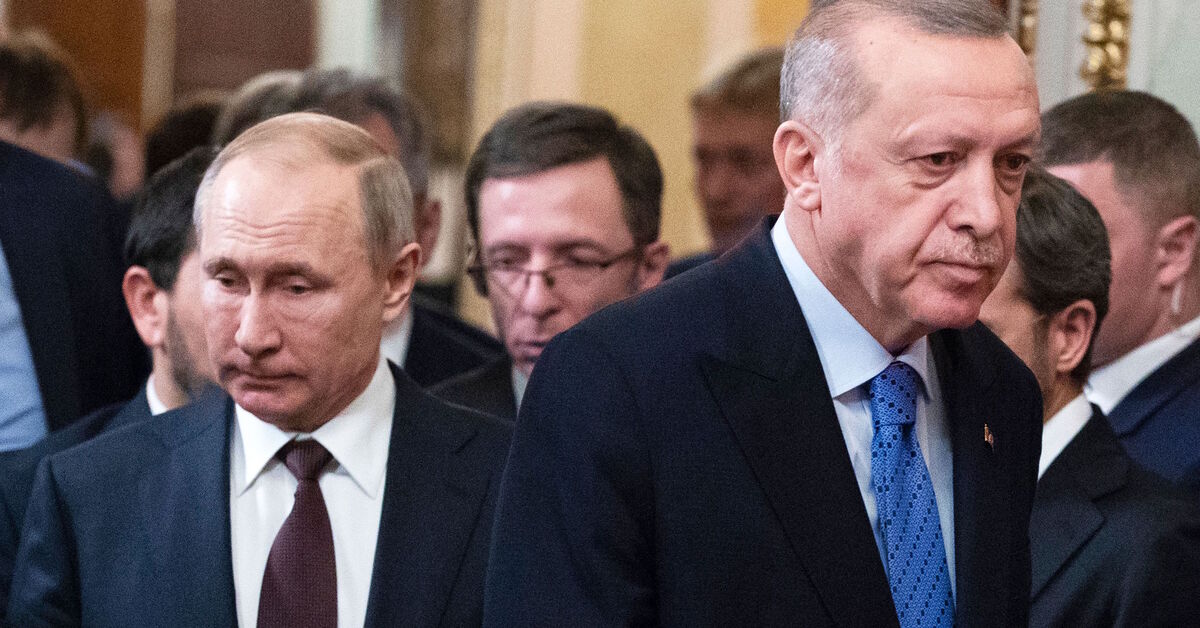As the escalation between the United States and Russia has intensified after Russia’s full-scale invasion of Ukraine and subsequent heavy U.S. and European sanctions, analysts have suggested two potential scenarios about Turkey’s course of action. One portrays Russia as the common enemy that could “could turn [Turkey] into the ally it is supposed to be.” The Russian threat, after all, has always been a powerful catalyst of westernization in Turkey.
An alternative view, given the burgeoning relations between Turkey and Russia, offers that Turkey is more likely to sit on the fence regarding this particular conflict. In contrast to its growing doubts over its relations with the United States and the European Union, direct Turkish-Russian relations have steadily developed over the past decade despite all the geopolitical conflicts between them. To make matters worse, Ankara’s nationalist and anti-Western expansionism aping an imperial nostalgia helps Turkish nationalists sympathize with Russia.
Although both understandings have their own merits, a middle way rationality seems to be a better assessment of how Turkey and Erdogan are likely to handle relations during the conflict. Russia’s actions in Ukraine cannot magically rejuvenate the Cold War spirit between Washington and Ankara. Yet Erdogan’s performance in previous regional crises demonstrates that he is not good at staying neutral and manipulating both sides. Instead, Ankara tends to take radical decisions and make sharp turns at critical moments—even if it would be in its material interests and capabilities to follow a more balanced policy. In this respect, a more radical Turkish stance against Russia, especially if the escalation between Russia and the United States continues, is not completely unlikely. However, this can hardly revive the Turkish-American alliance in the long term.
Turkish Impatience
Presenting itself as a neutral actor or a fair mediator between two sides is Ankara’s usual playbook at the onset of almost every regional crisis over the past decade. But, as the crisis escalates and blocs form, Turkish decision-makers have a poor record of maintaining this restrained stance.
Erdogan’s maneuvers during the Arab Spring demonstrations are perfect examples to show Turkish impatience and opportunism. Although it pursued a balanced policy in the Tunisian revolution, Erdogan took a big gamble by calling Egyptian leader Hosni Mubarak to step down. Erdogan was the first leader to make such a call, though the decision came after the Obama administration revealed its choice in favor of demonstrators.
In Libya, where Turkey had better political relations and higher economic interests, Erdogan’s turn was more dramatic. Erdogan was initially against both military operations and economic sanctions against the Libyan regime until the very last minute, with Erdogan stating, “what business does NATO have in Libya?”However, with the launch of aerial operations against the Libyan forces in 2011, Erdogan revoked his opposition and sided with Turkey’s NATO allies, ultimately becoming one of the major players in the conflict.
Likewise, Turkey initially attempted to play a mediator role in the Syrian crisis. The AKP government achieved unprecedented cooperation with the Syrian regime throughout 2000s. On the strength of this friendship, Ankara tried to convince Syrian President Bashar al-Assad to implement reforms after the immediate onset of the protests. Yet within a few months, Turkey was arming the Syrian opposition and turned into Assad’s implacable enemy. It is possible to argue that Erdogan anticipated a replication of the Libya scenario were a dire human rights situation to emerge in Syria.
In the 2017 Qatar crisis, Turkey repeated the pattern of attempted mediator turned participant. At the beginning of the crisis, Ankara advocated for a mediating role between Qatar and the four Arab countries—Saudi Arabia, the UAE, Bahrain, and Egypt.
At the time, FM Mevlut Cavusoglu said, “There could be problems between the countries but dialogue must prevail in all circumstances.” However, after a few days Erdogan depicted the blockade on Qatar as inhuman and un-Islamic. Turkey not only provided political and logistical help to the Qatari leadership when it was most needed but also openly took a side against the four Arab countries. However, given the high volume of Turkey’s economic relations with Saudi Arabia and the UAE, maintaining a neutral position might have seemed a better fit for its long-term interests.
These instances all demonstrate how Turkish leadership—namely Erdogan—can make sharp turns on key foreign policy issues, particularly if he feels that Ankara is missing out on an opportunity. Such attitudes may be related to Turkey’s authoritarian regime and Erdogan’s character, as he is not a diplomat who patiently pursues long-term strategies. He is more like a hot-tempered profiteer who seizes opportunities. In other words, Erdogan does not enjoy sitting on the fence for long.
A Marriage of Convenience?
As Russia has initiated its onslaught against Ukraine, the Turkish position has tilted towards the attitudes of other NATO countries, although it remains cautious in an attempt to not raise Moscow’s ire. Erdogan asked for decisive actions, not words or advice, from Western countries on February 25. On the same day, Defense Minister Hulusi Akar discussed humanitarian aid with his Ukrainian counterpart, and Ankara has since sent aid to Ukraine via Poland. Turkey has even decided to limit the passage of Russian warships from the straits. All these make Turkey more prone to cooperate with NATO, the EU, and the US. However, these efforts should be understood in the United States and Europe as representing a marriage of convenience rather than a real shift in American-Turkish relations.
Between the United States and Russia, the closer enemy poses more danger to the Turkish expansionist dreams in its region. Turkey and Russia have sided on different blocs in almost every regional issue, with Northern Syria being the one area where Ankara and Moscow have succeeded in working cooperatively. However, even this limited cooperation has remained alive with great difficulty, and at the cost of a Russian jet and tens or maybe hundreds of Turkish losses.
Ankara has likewise made a fuss with the United States over the latter’s policies in northeastern Syria. But it was the U.S. partnership with the Kurds that has annoyed the Turks there rather than U.S. military engagement in itself. In fact, the U.S. military interventions in the region have provided Ankara an opportunity to play the role of ‘key regional partner’ and subsequently collect political, economic, and military trophies. This is why Erdogan was still angry in 2016 about the Turkish Parliament’s failure in 2003 to pass a bill that would allow the United States a northern front against the Saddam regime.
A rational assessment of Turkey’s risks, threats, and interests alongside its nationalist and anti-Western mindset would estimatethat Ankara would pursue a policy of vigilant neutrality towards the war in Ukraine. Yet, previous incidents show that Turkish leadership is not good at maintaining such a policy, despite Russia’s unique place in the Turkish strategic understanding. Moscow is not an ordinary rival like Syria, Libya, Saudi Arabia, or even Iran.
However, the severity of the U.S.-Russian crisis and the apparent U.S. resolution to take action will be equally decisive in Ankara’s following steps. In other words, we should not rule out more radical Turkish steps against Russia, especially if the United States decides to take more concrete action, but we should not either expect such potential cooperation to be a savior for American-Turkish relations.
In terms of his expansionist ambitions, aggressiveness, anti-Western sentiments, and authoritarian character, Erdogan is not much different from Putin as a leader—albeit with a weaker military capability. Like Putin, he is eager to re-draw his territorial borders and establish a broad zone of influence.
Given his nature, a quagmire in Ukraine or a Pyrrhic victory may even encourage Erdogan to take bolder steps in Turkey’s back yard to take advantage of Russia’s distraction. In this respect, it is not so surprising to see how the American-Turkish relationship has lost its grounds and value-based understanding. Washington and Ankara can temporarily have congruent positions on some issues—even major ones—but the two sides’ incompatible visions and interests, not to mention a lack of mutual confidence, make a true rapprochement unlikely.
Hasim Tekines
Hasim Tekines previously worked in the Turkish Ministry of Foreign Affairs and Prime Ministry. He is currently an MA student at Leiden University focusing on Middle East Studies. Tekines is a contributor to Fikra Forum.
Source: Washington Institute for Near East Policy,



